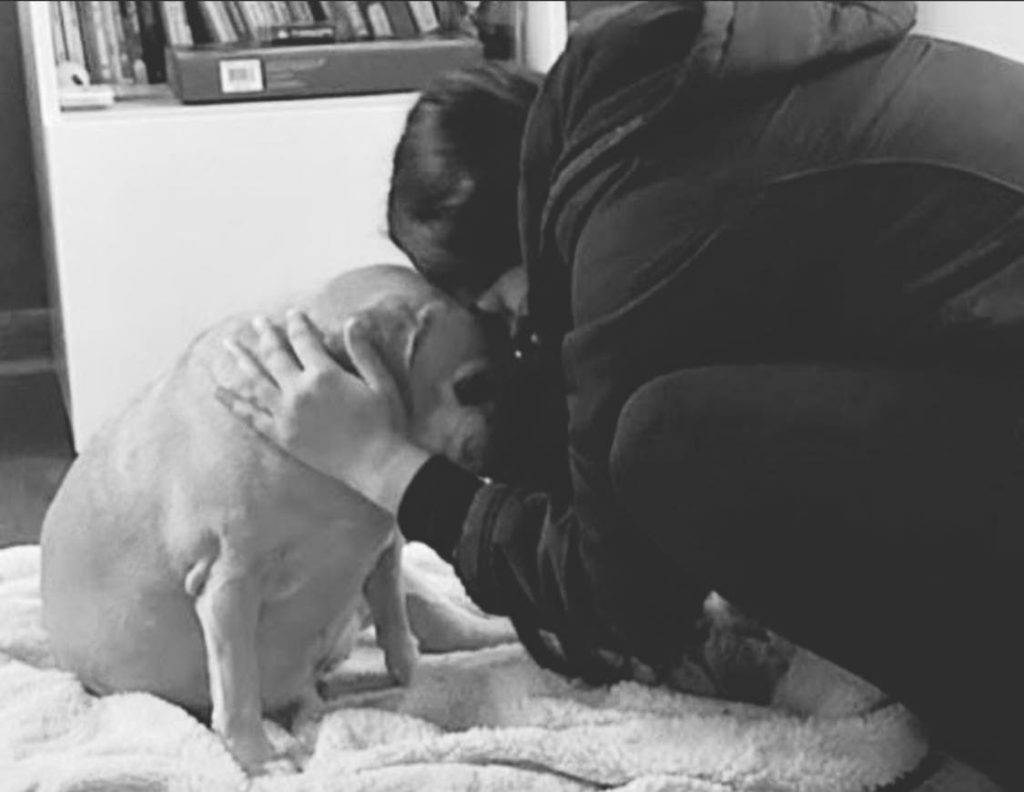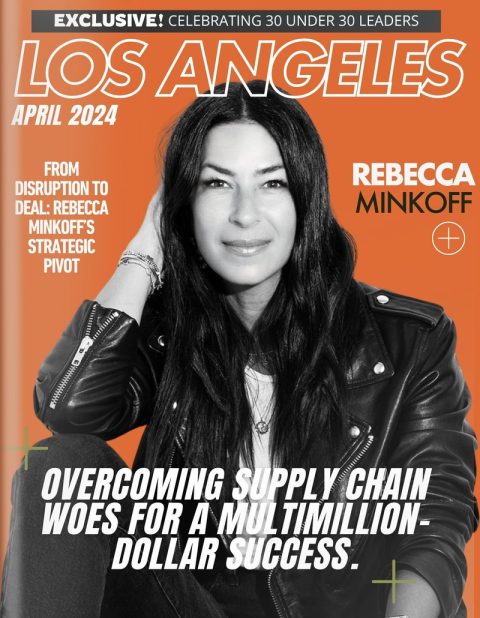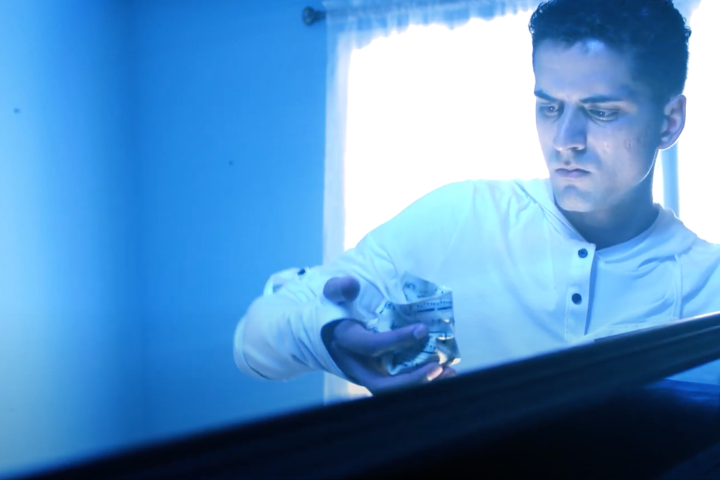
·
4972 views
A Story That Reveals a Systemic Gap
Rosie, a senior Puggle with soulful brown eyes and a gentle, grounding presence, was more than a pet—she was family. Although originally brought into the relationship by Tameer’s former partner, Rosie soon became the emotional anchor of a household shaped by consistency, structure, and care.
When Rosie entered the home, she was already struggling with severe separation anxiety. Drawing on her clinical background in animal-assisted interventions, Tameer integrated Rosie into grounding and mindfulness routines, weaving her into daily life. Rosie accompanied her during Pilates sessions as a form of co-regulation, rested beside her during meditation, and became embedded in the household’s stabilizing rituals.
From an attachment perspective, Tameer became Rosie’s secure base—the figure whose presence offers safety, predictability, and emotional regulation.
During work hours, Rosie was almost always nearby: sleeping beneath Tameer’s desk while she saw therapy clients remotely, or curled behind her chair as she supported others navigating their own attachment wounds. Over time, Rosie’s calming presence became part of the therapeutic environment itself. Clients knew her by name and immediately noticed when she was gone.
This pattern of care continued even after the couple separated. Rosie remained with Tameer the majority of the time, and Tameer continued serving as her primary caregiver, maintaining the routines and stability Rosie depended on.
Then, nearly a month after the breakup, everything changed.
One afternoon, after returning from a walk with Rosie, Tameer’s former partner pulled into the driveway, placed Rosie into her car, and assured Tameer she would bring her back.
She never did.
Despite repeated good-faith efforts to reconnect, request visitation, and advocate for Rosie’s well-being—particularly given her history of severe separation anxiety—Tameer has not seen Rosie since that day.
What followed was a different kind of grief: not only the loss of daily life with Rosie, but the realization of how easily caregiving, attachment, and lived reality could be erased by people who knew the truth—and by a legal system not built to recognize it.

When Attachment Is Weaponized
During this same period, Tameer says she experienced the peak of relational aggression from her former partner and their circle—misinformation, mischaracterizations, and weaponized mental-health insinuations that spread without anyone asking her what had actually happened.
After nearly a decade of being deeply embedded in her former partner’s family and social world, the isolation was destabilizing.
“Everyone who could have acted turned a blind eye,” Tameer said. “It felt like screaming into a void—unheard, dismissed, erased. But Rosie’s truth deserved to be heard, even if mine wasn’t.”
She describes the pattern plainly:
“It’s a classic form of reactive abuse—declaring someone unstable, removing their emotional anchor, and then framing their understandable distress as evidence.”
The emotional toll was devastating. The legal consequences were even sharper.
When the Law Works Against Compassion
Tameer served as Rosie’s primary caregiver for the longest continuous period of Rosie’s life. Because Illinois law only considers an animal’s well-being in divorce cases, she also submitted a notarized domestic-partnership affidavit and a completed marriage-license application demonstrating shared intent to merge households, finances, and caregiving responsibilities.
Under current law, none of it mattered.
The breaking point came when Tameer finally regained access to Rosie’s medical records and discovered she had been removed—without notice—as co-signer and emergency contact.
What shook her most was reading Rosie’s decline documented in writing. After more than six years of continuous care, Rosie showed lethargy, gastrointestinal distress, and heightened anxiety—classic signs of separation trauma.
Clarifying Rosie’s Role—Without Creating Hierarchies
Following her own clinical decline, Tameer submitted documentation identifying Rosie as a service dog. But she is clear: the designation was never the point.
Because her mental health had already been weaponized, Tameer hesitated to disclose the depth of therapeutic support Rosie provided. She did not want the story to hinge on labels or imply that only people with documentation—or only specially designated animals—deserve protection.
“There’s privilege in even having access to a medically prescribed animal,” she said. “I didn’t want Rosie’s worth—or anyone else’s pet’s worth—to hinge on a label many people can’t access.”
Her focus remained on the fundamentals: Rosie’s history of separation anxiety, her reliance on consistent caregiving, and the harm caused by sudden, unregulated separation.
“Love, attachment, and caregiving should matter,” Tameer said. “A label shouldn’t be the deciding factor.”

Inside the Courtroom
At the initial hearing, Tameer asked that Rosie be allowed to choose where she wanted to live, referencing a well-known Judge Judy case in which a dog immediately ran to the person it recognized as home.
The judge rejected the request, comparing it to “asking a car to take the witness stand.”
“I wasn’t comparing Rosie to a car,” Tameer said. “I was trying to explain attachment.”
At the evidentiary hearing, procedural inequities deepened. The session began more than an hour late. Key witnesses—including Rosie’s sitter, groomer, and neighbors—were forced to leave for work before testifying. Their affidavits were dismissed as hearsay.
Representing herself pro se, Tameer was given less than thirty minutes to present multiple binders documenting years of caregiving, cost, care, and control.
The presiding judge declined to apply Illinois’s “superior possessory interest” guidance and instead focused narrowly on sequence—who had Rosie first—comparing the situation to “Christopher Columbus discovering America.”
“By your own example, you’ve proven my point,” Tameer replied. “Sequence shouldn’t matter because Columbus was not the first to discover US.”
She was told to take a seat.
“It felt like everything real—evidence, caregiving, Rosie’s well-being—had become invisible.”
Despite reputational harm and public scrutiny, Tameer maintains a thriving clinical practice, operates a successful e-commerce business, and continues to write music—one of her songs recently charting in the UK Apple iTunes Top 40 Alternative Playlist.
Of all her roles, she remains most devoted to telling Rosie’s story.
She made Rosie a vow: the rest of her life would be the best of her life.
Today, she lives just four and a half miles from Rosie—a fifteen-minute drive.
“To be so close, yet so far,” she said, “is its own heartbreak.”
Rosie’s case exposes a national legal gap. Several states—including Alaska, California, New York, Maine, and Illinois—allow courts to consider an animal’s well-being—but only in divorce cases.
There is no U.S. state that requires courts to consider animal welfare, attachment, or caregiving history in disputes involving unmarried partners.
If Illinois adopts reforms requiring courts to evaluate caregiving history and animal welfare in all pet-custody disputes, it would become the first state in the nation to do so.
“This isn’t about winning,” Tameer said. “It’s about progress that protects living beings.”
Tameer is in the process of drafting proposed legislation, building an advocacy team, and advancing Rosie’s Law—a national policy initiative focused on encouraging legal recognition of caregiving history and animal welfare considerations in companion-animal custody determinations.
Her commitment remains the same:
Rosie’s truth must be heard.
And the system must evolve.

About Tameer
Tameer Siddiqui, PsyD is the founder and clinical director of Heart of Healing, a private practice offering psychotherapy grounded in relational, attachment-based, and trauma-informed frameworks.
Dr. Tameer also serves as the Director of the Rosie’s Law Initiative, where she oversees policy development, research synthesis, stakeholder engagement, and public advocacy related to companion-animal custody reform.
Grounded in her clinical training as a licensed psychologist, her work as an Illinois-licensed real estate broker and investor, and her lived experience navigating outdated property statutes, she guides the Initiative’s work to educate legislators, legal councils, and advocacy organizations on caregiving-centered legal standards aligned with modern family structures.
If you are interested in learning more about Rosie’s Law or assisting with the Initiative’s advocacy efforts, please contact:
Hassan Mustafa
Policy Outreach Coordinator
Rosie’s Law Initiative
708-465-1188
admin@privatepractice.icu





















